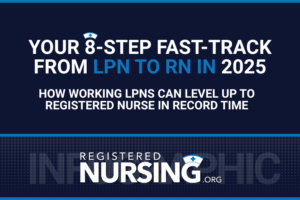What Is an LPN/LVN? Complete Guide to Licensed Practical & Vocational Nursing
- What Do LPNs/LVNs Do?
- Where Do LPNs/LVNs Work?
- How to Become an LPN/LVN
- LPN/LVN Licensing Requirements
- LPN/LVN Certifications and Specializations
- Who Do LPNs/LVNs Report To?
- LPN/LVN Career Advancement
- LPN/LVN Salary and Job Outlook
- Comparing Nursing Roles: LPN/LVN vs. Other Healthcare Positions
- Resources for Prospective LPN/LVN Students
- Is an LPN/LVN Career Right for You?
- FAQ About LPN/LVN Careers
- Latest Articles & Guides

LPNs and LVNs are typically responsible for more basic kinds of patient care and comfort measures. They report directly to registered nurses (RNs) and physicians. Treatment plans for patients that are guided by RNs are generally based on the data and observations collected by LPNs.
Licensed Practical Nurses (LPNs) and Licensed Vocational Nurses (LVNs) play a vital role in the healthcare system, providing essential patient care under the supervision of registered nurses (RNs) and physicians. While the job duties are identical, the title varies by state—California and Texas use LVN, while the other 48 states use LPN.
These healthcare professionals serve as a critical link between certified nursing assistants (CNAs) and registered nurses, making them indispensable team members in various healthcare settings. If you’re considering a nursing career with faster entry into the workforce than an RN pathway, the LPN/LVN route offers a rewarding option with strong job prospects.
What Do LPNs/LVNs Do?
LPNs/LVNs provide direct patient care and perform numerous healthcare duties, including:
- Monitoring vital signs and patient health status
- Administering medications and injections
- Changing dressings and wound care
- Inserting catheters and providing basic treatments
- Collecting specimens for testing
- Assisting patients with activities of daily living
- Documenting patient information and reporting changes to RNs/physicians
- Providing emotional support to patients and families
- Supervising nursing assistants in some settings
The specific duties vary based on state regulations, workplace setting, and specialty area. Some states allow LPNs/LVNs to perform additional tasks such as starting IV lines, while others have more restrictions.
See the difference between an LPN and an RN.
Where Do LPNs/LVNs Work?
LPNs/LVNs work in diverse healthcare environments including:
- Long-term care facilities (41% of LPNs/LVNs work in nursing homes)
- Hospitals (14% of the LPN/LVN workforce)
- Physicians’ offices and clinics
- Home healthcare agencies
- Rehabilitation centers
- Assisted living facilities
- Schools and correctional facilities
- Hospice and palliative care
- Outpatient care centers
- Government agencies
Each setting offers different experiences, schedules, and specialization opportunities. Long-term care facilities typically employ the most LPNs/LVNs, where they often supervise CNAs and manage patient care plans.
Learn how an LPN can become a Managed Care Nurse.
How to Become an LPN/LVN
Becoming an LPN or LVN requires the right combination of education, clinical experience, and licensure.
LPN/LVN Educational Requirements
The path to becoming an LPN/LVN follows these steps:
- Complete high school or obtain a GED – Focus on science and math courses to build a strong foundation
- Enroll in an accredited practical nursing program – Choose a program approved by your state’s board of nursing
- Complete required clinical hours – Gain hands-on experience under supervision
- Graduate from the program – Receive your certificate or diploma
- Pass the NCLEX-PN exam – Successfully complete the national licensing examination
- Apply for state licensure – Submit required documentation and fees to your state board
Are you looking to save some money on an LPN to RN program? Read all about affordable LPN to RN programs.
LPN/LVN Program Length
Most LPN/LVN programs take approximately:
- 12-18 months for full-time programs
- 18-24 months for part-time programs
Program length varies depending on:
- Whether prerequisites are included in the curriculum
- Full-time vs. part-time attendance
- Traditional vs. accelerated format
- Semester vs. quarter system
LPN/LVN Program Curriculum
Typical coursework includes:
- Anatomy and physiology
- Basic nursing concepts
- Pharmacology
- Medical-surgical nursing
- Maternal and child health
- Mental health concepts
- Geriatric nursing
- Clinical skills laboratories
- Supervised clinical rotations
Most programs require between 700-1,500 total hours, with approximately 500+ clinical hours included in that total.
Online LPN/LVN Programs
While fully online LPN/LVN programs aren’t possible due to clinical requirements, many schools offer hybrid options:
- Hybrid programs: Complete theory courses online with in-person clinical components
- Distance learning: Some rural areas offer distance education with local clinical placements
- Flexible scheduling: Evening/weekend options for working students
When considering online components, ensure:
- The program is accredited and approved by your state board of nursing
- Clinical placements are available in your area
- The program meets licensing requirements for your state
- Technical requirements (computer, internet) can be met
LPN/LVN Program Tuition Costs
The cost of LPN/LVN education varies significantly based on the type of institution the student attends:
- Public community colleges: $5,000-$15,000 total
- Private vocational schools: $10,000-$30,000 total
- Hospital-based programs: $5,000-$25,000 total
Additional costs include:
- Textbooks and supplies: $1,000-$2,000
- Uniforms and equipment: $200-$500
- Exam fees: $200-$400
- Licensing fees: $75-$200
Financial aid options include:
- Federal financial aid (FAFSA)
- Scholarships from healthcare organizations
- Employer tuition assistance programs
- Workforce development grants
- Veteran benefits (GI Bill)
LPN/LVN Licensing Requirements
Becoming properly licensed as an LPN or LVN in your state is essential. Review the examination and licensure process below.
NCLEX-PN Examination
After completing an approved program, candidates must pass the National Council Licensure Examination for Practical Nurses (NCLEX-PN):
- Computer adaptive test (CAT)
- 85-205 questions
- Five-hour time limit
- $200-$300 fee (varies by state)
- Tests safety and infection control, health promotion, psychosocial integrity, and physiological integrity
The national first-time pass rate averages around 85%.
State Licensing Process
Each state has specific licensing requirements:
- Application submission to state board of nursing
- Background check (criminal history review)
- Fingerprinting
- License fee payment ($75-$200 depending on state)
- Verification of education from your nursing program
- Proof of passing NCLEX-PN
Processing times vary from 2-8 weeks. Some states participate in the Nurse Licensure Compact (NLC), allowing LPNs/LVNs to practice in multiple states with one license.
LPN/LVN Certifications and Specializations
While not required, specialized certifications can enhance career opportunities – a few popular options include:
- IV Therapy Certification
- Long-Term Care Certification
- Wound Care Certification
- Pharmacology Certification
- Developmental Disabilities Certification
These certifications typically require:
- Additional coursework (20-60 hours)
- Clinical experience in the specialty
- Passing a certification exam
- Fees ranging from $100-$400
- Renewal every 1-3 years
Who Do LPNs/LVNs Report To?
LPNs/LVNs operate within a defined supervision structure that varies by healthcare setting and state regulations. Understanding this reporting hierarchy is essential for those considering this career path:
Direct Supervisors
- Registered Nurses (RNs): In most settings, LPNs/LVNs report directly to RNs who oversee their work and provide guidance on patient care plans. RNs delegate tasks to LPNs/LVNs based on scope of practice and patient needs.
- Charge Nurses: On specific shifts, LPNs/LVNs report to the designated charge nurse who manages workflow and assigns patients.
- Nurse Managers/Supervisors: These administrative leaders oversee nursing department operations and may directly supervise LPNs/LVNs, particularly in smaller facilities.
Additional Oversight
- Physicians/Medical Doctors: LPNs/LVNs carry out physicians’ orders for patient care and treatments, making physicians part of their supervisory chain, especially in physicians’ offices and clinics.
- Advanced Practice Registered Nurses (APRNs): In some settings, LPNs/LVNs work under the direction of nurse practitioners or clinical nurse specialists.
- Director of Nursing (DON): In long-term care facilities, the DON has ultimate responsibility for nursing care, including LPN/LVN practice.
Supervisory Responsibilities
Interestingly, LPNs/LVNs often occupy a middle position in the healthcare hierarchy:
- They take direction from RNs and physicians
- They may simultaneously supervise CNAs, nursing assistants, and other support staff
- In long-term care, experienced LPNs/LVNs often serve as shift supervisors or charge nurses
This dual role—being both supervised and supervisor—requires strong communication skills and understanding of scope of practice boundaries.
LPN/LVN Career Advancement
The LPN/LVN role offers several career advancement paths:
- LPN to RN Bridge Programs: Complete an associate’s or bachelor’s degree in nursing (typically 1-2 years with LPN experience)
- Specialized Practice Areas: Focus on pediatrics, geriatrics, or other specialties
- Charge Nurse Positions: Supervise other LPNs/LVNs and CNAs
- Case Management: Coordinate patient care (with additional education)
- Management Roles: Become a unit manager in long-term care
Many employers offer tuition assistance for LPNs/LVNs pursuing RN education.
LPN/LVN Salary and Job Outlook
According to the Bureau of Labor Statistics:
- Median annual salary: $48,070 (May 2022)
- Salary range: $37,150 to $63,790
- Job growth projection: 5% through 2031
Salary variations depend on:
- Geographic location (highest in Alaska, California, and Massachusetts)
- Work setting (hospitals typically pay more than nursing homes)
- Experience level (5+ years experience increases earning potential)
- Additional certifications and specializations
- Shift differentials for evenings, nights, and weekends
Comparing Nursing Roles: LPN/LVN vs. Other Healthcare Positions
Learn how practical/vocational nursing stacks up against certified nursing assistants, RNs who hold an ADN degree, and RNs who hold a BSN degree:
| Factor | CNA | LPN/LVN | RN (ADN) | RN (BSN) |
| Education Required | 4-12 weeks | 12-18 months | 2-3 years | 4 years |
| Program Cost | $1,000-$2,000 | $5,000-$30,000 | $15,000-$40,000 | $40,000-$100,000+ |
| Licensing Exam | State-specific | NCLEX-PN | NCLEX-RN | NCLEX-RN |
| Median Annual Salary | $30,290 | $48,070 | $77,600 | $77,600+ |
| Primary Duties | Basic patient care, ADLs | Direct patient care, basic treatments | Complex care, assessments, care planning | Complex care, leadership, research |
| Autonomy Level | Low | Moderate | High | High |
| Advancement Opportunities | Limited | Moderate | Extensive | Extensive |
| Management Potential | Limited | Some (especially in LTC) | Yes | Yes (more opportunities) |
Resources for Prospective LPN/LVN Students
- National Association for Practical Nurse Education and Service (NAPNES)
- National Federation of Licensed Practical Nurses (NFLPN)
- State-specific LPN/LVN associations
Is an LPN/LVN Career Right for You?
Consider pursuing an LPN/LVN career if you:
- Want to enter the nursing field relatively quickly
- Enjoy direct patient care and hands-on work
- Prefer working as part of a healthcare team
- Need a flexible schedule with various shift options
- Are considering nursing but want to test the field before committing to RN education
- Plan to work while advancing your education
The LPN/LVN role provides a solid foundation in nursing skills, offers stable employment opportunities, and can serve as a stepping stone to advanced nursing roles while allowing you to make a meaningful difference in patients’ lives.
FAQ About LPN/LVN Careers
What’s the difference between an LPN and LVN? Only the title differs. LVN (Licensed Vocational Nurse) is used in California and Texas, while LPN (Licensed Practical Nurse) is used in all other states. The education, scope of practice, and licensing exam are essentially the same.
Can I work as an LPN/LVN while studying to become an RN? Yes, many LPN-to-RN students work part-time as LPNs/LVNs while completing their RN education, gaining valuable experience and income.
Are there any age restrictions for becoming an LPN/LVN? You must be at least 18 years old to take the NCLEX-PN in most states, but there is no upper age limit.
How physically demanding is LPN/LVN work? The role can be physically demanding, requiring standing for long periods, lifting patients, and performing repetitive tasks. Good body mechanics and self-care are important.
Can I become an LPN/LVN if I have a criminal record? It depends on the nature and timing of the offense. State boards of nursing evaluate criminal history on a case-by-case basis, with some offenses causing automatic disqualification.
What’s the most challenging part of being an LPN/LVN? Common challenges include managing multiple patients, emotional burnout, and balancing technical skills with compassionate care. However, many LPNs/LVNs find these challenges outweighed by the rewards of helping patients.
Latest Articles & Guides
One of the keys to success as a registered nurse is embracing lifelong learning. Our articles and guides address hot topics and current events in nursing, from education to career mobility and beyond. No matter where you are on your nursing journey, there’s an article to help you build your knowledge base.
Browse our latest articles, curated specifically for modern nurses.



